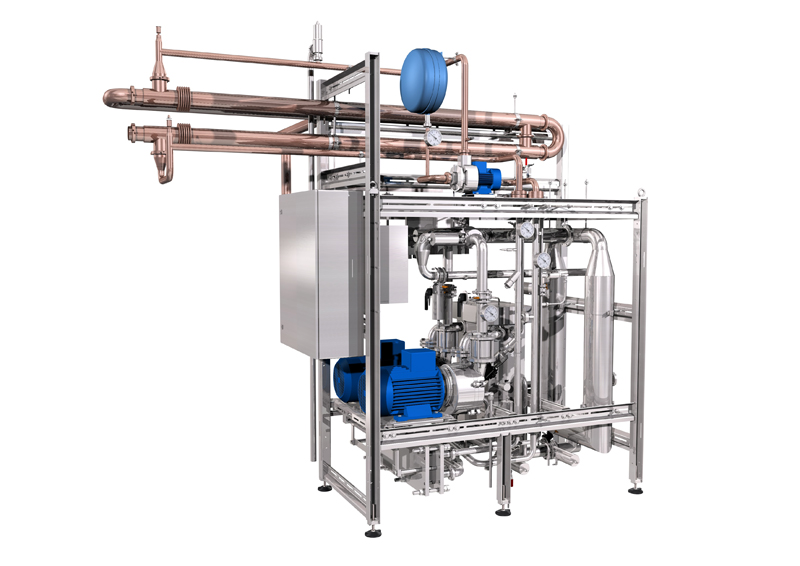Vacuum pump helps saving water
With the Eco vacuum pump KHS can already help the brewing industry to save almost 100 % water compared to the classic water ring pump. The new KHS Eco+ vacuum pump – or rather, the newly designed KHS Eco+ module integrated into the Eco vacuum pump – now has the added benefit that classic coolants for water recooling are now a thing of the past. This means that customers no longer have to invest in piping for coolant transfer which is often complex and costly.
Vacuum pumps are used for low-pressure gas exchange before beer is filled into glass or PET bottles, thus greatly reducing the amount of CO2 consumed by the system. Classic water ring pumps draw in the air present in the bottles and compress it using rotors. The rotors operate with water that is equally necessary for lubricating, sealing, and cooling. Together with the used water the gas passes at a higher pressure into what’s known as a sealing water tank, specially provided for interim storage, from whence it is discharged in a controlled manner. Water is either removed from the process as wastewater or fed back to the suction end of the pump and reused. If this water is recycled, this means that with classic water ring pumps operators must reckon on a drop in performance. The reason for this is that the water warms up when the gas is compressed; the initial power level can only be retained by cold water being permanently added.
The Eco vacuum pump no longer needs this permanent addition of cold water to maintain the required and consistent high level of power thanks to the inclusion of a pre-separator and heat exchanger. The pre-separator segregates return gas and any beer foam that may have entered the process. The gas is then discharged as normal from the sealing water tank, with the water passing through a heat exchanger and cooled down to a temperature which ensures that the initial power is maintained. Up to 99% water can be saved in this manner.
Many breweries can see the advantages of using the Eco vacuum pump but are put off by the cost of the elaborate piping needed to convey coolant to the pump. This is where the KHS Eco+ module comes in. When applied, classic coolants become redundant – and therefore no piping is needed for them. The basic idea behind the innovation is that beer is usually stored cold and could thus also be used to cool the water in the vacuum pump prior to filling. On its way to the filler the beer in the KHS Eco+ system therefore flows straight past the vacuum pump in a pipe-in-pipe system (M-tube). The temperature of the circulated water is greatly reduced by the cold M-tube (an extremely hygienic piping system which is also used in the pharmaceuticals industry) and then fed to the heat exchanger, which is also part of the Eco system, where it acts as a coolant. In addition to the Eco setup all that’s thus needed for the KHS Eco+ process are a second water circuit and a pipe-in-pipe system containing product en route to the filler that flows straight past the vacuum pump. Should the filler come to standstill, the system immediately registers this and stops the heat transfer. The temperature of the beer itself rises by just 1 °C maximum when the KHS Eco+ development is used. For the filling line downstream of the pump, this is more of a boon than a hindrance; if beer is bottled when it’s too cold, condensation can form on the bottles.
It’s for this reason that many breweries specifically have their product warmed by heat exchangers prior to filling. The KHS Eco+ module can be easily retrofitted into existing Eco vacuum pumps. To this end the piping is integrated into the given system and the product control, electrics, and software adjusted accordingly.
The Eco+module can be applied to classic water ring pumps, KHS Eco vacuum pumps, and KHS Eco+.
Source
BRAUWELT International 2013


